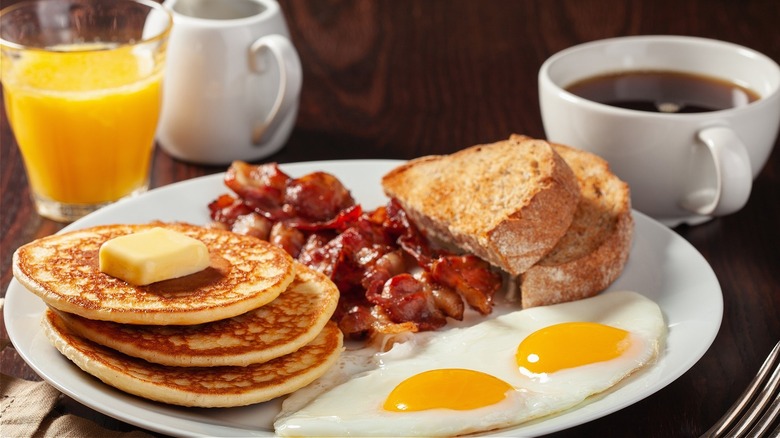The Unexpected Breakfast Food That's Faced The Highest Inflation
It's no secret that inflation hit the world hard just as the pandemic started to ease. According to the Bureau of Labor Statistics, the price of food, in general, has increased 10.8% in the past year. The Consumer Price Index shows that food at home prices have climbed 11.9% from May 2021 to May 2022. Everyone's feeling pain in their wallets, but food price increases have not been the same across the board.
The Financial Times noted that the price of bulk wheat, coffee, orange juice, milk, sugar, and oat contracts have jumped an average of 28% since 2019. The bottom line? Breakfast, the most important meal of the day, may now be the most expensive in some cases. Studies currently indicate that the price of basic bulk ingredients for most breakfasts have skyrocketed compared to other meals of the day. While prices of raw bulk staples have jumped up to 60%, this pricing is not typically seen by American consumers. Shocked? Don't be. These are back-end prices that are used by companies prior to reselling products. When it comes to the prices that most consumers face, the blow is far lighter. However, the products that face the fastest consumer inflation may surprise you.
It's getting pricier to crack an egg
According to the Consumer Price Index, the price of fruits and vegetables increased by 8.6% from May 2021 to May 2022. Believe it or not, that was one of the lowest price changes. The index featuring meats, poultry, fish, and eggs increased a total of 14.2%. What was the most expensive breakfast food to increase in price? That would be the humble egg.
Eggs have increased in price by a whopping 32.2% over the past year. For the longest time, this breakfast staple was one of the cheapest sources of "perfect protein." They have gone from a low of $1.40 per dozen to up to $2.90 per dozen on average (via EatingWell). As if inflation wasn't enough, a major bout of avian flu has caused egg prices to increase, as millions of poultry birds have died of the illness.
The avian flu crisis isn't the only issue facing egg and poultry farmers today. Due to the war in Ukraine, the prices of chicken feed also climbed (via NBC). Those costs got passed directly onto consumers. However, there is some good news on the horizon. These high prices are not going to be around forever. Experts agree that as avian flu cases subside, egg prices will decline.

